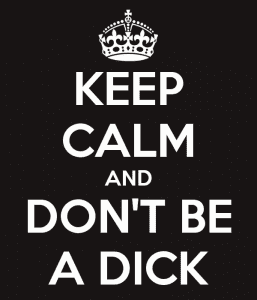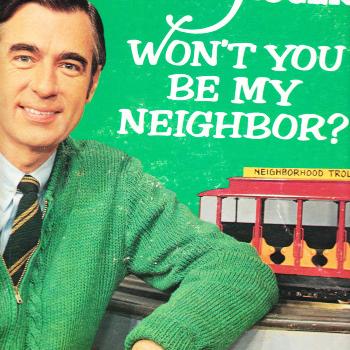Pope Francis is, once again, making waves with his off-the-cuff remarks on airplanes. During a press conference on a flight from Sri Lanka to the Philippines, Francis spoke about the right to free speech and free expression.
First, let’s look at the part that didn’t create controversy. French reporter Sebastian Maillard asked this question: “Yesterday at mass you spoke about religious freedom as a fundamental human right. But in the respect for the different religions, up to what point can one go in freedom of expression? That too is a fundamental human right.”
Here’s the beginning of Francis’ reply:
I believe that both are fundamental human rights, religious liberty and liberty of expression. One cannot — but let’s think — you are French? Let’s go to Paris, let’s speak clearly. One cannot hide a truth: everyone has the right to practice one’s religion, one’s own religion without giving offense. Freely. That’s how we do it, we want everyone to do that. Second: One cannot offend, make war, kill in the name of one’s own religion, that is, in the name of God. To us, that which happens now, it stuns us. But let’s think about our own history: how many wars of religion have we had? You may think of the night of St. Bartholomew; how can this be understood? We too were sinners in this. But one cannot kill in the name of God. This is an aberration. To kill in the name of God is an aberration. I believe that this is the principal point in terms of religious liberty. One has freedom in this, but without imposing or killing in the name of religion.
As for freedom of expression: each one not only has the freedom, the right but also the obligation to say what one thinks to help the common good. The obligation! Let’s think, if a member of parliament or a senator doesn’t say what he thinks is the right path then he does not collaborate for the common good. Not only these, but many others too. We have the obligation to say openly, to have this liberty, but without giving offense, because it is true, one cannot react violently.
The context of the pope’s trip informs his answer here. He’s just spent several days in Sri Lanka — a nation torn by civil war and inter-religious violence. He addressed that conflict and the desperate need for interfaith tolerance and respect earlier in the press conference, and that discussion seems to have shaped Maillard’s question here, too.
I think that context also shapes the next bit of Francis’ reply, which is the bit that has drawn criticism:
We have the obligation to say openly, to have this liberty, but without giving offense, because it is true, one cannot react violently. But if Dr. Gasbarri [the papal trip organizer who was standing beside him], a great friend, says a bad word against my mother, then a punch awaits him. But it’s normal, it’s normal. One cannot provoke, one cannot insult other people’s faith, one cannot make fun of faith. … And so many people who speak badly about other religions, or religions [in general], they make fun of, let’s say toy with [make into toys] other people’s religions, these people provoke and there can occur what would happen to Dr. Gasbarri if he said something against my mother. That is, there is a limit. Every religion has dignity; every religion that respects life, human life, the human person. And I cannot make fun of it. This is a limit and I have taken this sense of limit to say that in freedom of expression there are limits, like that in regard to my mom.
Gerard O’Connell, writing for America, summarizes this by saying: “The pope affirmed the right to freedom of expression” but “made it very clear that freedom of expression had certain limits, and a person is not entitled to offend, ridicule, mock, or treat the religion — any religion — as a toy that can be played with.”
If that’s what Francis intended to say, then I agree with the critics who are now condemning him for suggesting “certain limits” on the freedom of expression. But I’m not certain that is quite what he was trying to say.
I don’t speak Italian, and so it’s difficult to be parsing these comments second-hand, in their English translation, but let’s focus on the main troubling bit here: “One cannot provoke, one cannot insult other people’s faith, one cannot make fun of faith.”
That’s an odd use of the word “cannot.” The pope’s response would have been far less troubling if he had said, instead, “should not” — “One should not provoke, one should not insult other people’s faith, one should not make fun of faith.”
 Think, for example, of Rule No. 1. That’s an important rule — that’s why it comes first. But what kind of rule is it?
Think, for example, of Rule No. 1. That’s an important rule — that’s why it comes first. But what kind of rule is it?
It’s certainly not a legal rule. “Don’t be a dick” doesn’t mean that dickishness is or ought to be against the law. So I wouldn’t want to rephrase Rule No. 1 as “One cannot be a dick,” but rather as something more like “One should not be a dick.”
Rule No. 1 doesn’t mean that we don’t have the right to be dicks to one another. What it means is that we’d all be better off if we used our freedom and our rights to, you know, not be total dicks.
Rule No. 1, in other words, isn’t the same kind of rule as Amendment No. 1. But just as the First Amendment’s right to freedom of speech mustn’t be limited or qualified by the obligation not to be a dick, neither should the guaranteed, unqualified right to freedom of speech be treated as an exemption from Rule No. 1.
Mark Silk thinks that’s what Pope Francis was trying to say. Given the context of the pope’s other remarks about the religious conflicts in Sri Lanka and elsewhere, I suspect he’s right.
I think we can see that, too, in the other places in his remarks where Francis uses that term “cannot.” Just before he said “one cannot insult other people’s faith,” he said, “One cannot offend, make war, kill in the name of one’s own religion, that is, in the name of God.” He said that while acknowledging — and confessing — the reality that killing in the name of God is something that happens. There, it seems, his use of “cannot” seems to mean something closer to should not.
I suspect the same is true in his supposed endorsement of limits on freedom of expression as well. He says “one cannot react violently” to religious offense, but then immediately after says that such a violent response is likely and expected. So I suspect, throughout, we might better understand Francis’ comments by substituting the translation of “cannot” with the phrase “should not.”
But that’s just a guess. And, in any case, I do not speak for the pope and the pope does not speak for me.
So let me just speak for me: Religion is not off-limits when it comes to the freedom of expression. We have the right to offend, to disrespect, to question, to mock, to insult, to be irreverent, and to blaspheme.
But that doesn’t mean we should. Having the right to offend, to disrespect or to insult others does not mean that we are obliged to do so. It does not mean that it is always wise or truthful or constructive or loving or just to do so. (Sometimes, I think it is. In the context of laws forbidding blasphemy, for example, I think blasphemy may sometimes become a kind of moral duty.)
But an unwavering, unqualified commitment to freedom of expression doesn’t mean we can claim to be exempt from Rule No. 1. Having the right to act like a dick doesn’t miraculously make it possible to act like a dick without thereby becoming a dick.
Or, as Voltaire didn’t say either, “I disapprove of your dickishness, but I will defend to the death your right to be a dick.”












